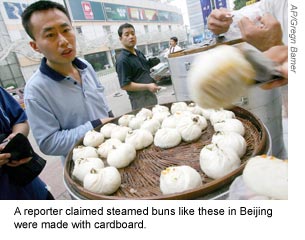
In China, one journalist freed, another expected to be released soon
New York, September 14, 2007— The Committee to Protect Journalists welcomes reports than Zhao Yan, a Chinese research assistant for The New York Times, is expected to be freed on Saturday morning, according to the Times. If released, Zhao will have served his combined three-year sentence in prison and pretrial detention on a fraud conviction,…
In China, a jailed Internet writer is mistreated, denied access to family
New York, August 31, 2007—The Committee to Protect Journalists is deeply concerned by reports that imprisoned writer and activist Guo Qizhen has been mistreated in custody, may not be receiving adequate medical attention, and has been denied access to his family. In an interview with CPJ, Guo’s wife, Zhao Changqing, said that she has been…
CPJ calls for release of imprisoned Chinese writer in failing health
Dear President Hu: The Committee to Protect for Journalists (CPJ) is deeply concerned about the deteriorating health of writer Zhang Jianhong and calls for his immediate and unconditional release on humanitarian grounds. Zhang has been diagnosed with a rare nerve disorder that could lead to permanent paralysis if left untreated. His numerous appeals to judicial authorities in Zhejiang province seeking release on medical parole have been ignored, according to both his wife and lawyer.
In China, reporter jailed for allegedly fabricating news
New York, August 14, 2007 – The Committee to Protect Journalists is disappointed by the severe criminal penalties handed down by a Chinese court in the case of Zi Beijia, a Beijing TV reporter accused of fabricating a story about contaminated buns. On August 12, the Beijing No. 2 Intermediate People’s Court found Zi guilty…

Chinese reporter accused of fabricating story held on unclear charges
New York, July 23, 2007—The Committee to Protect Journalists calls for greater transparency in the arrest of a Chinese reporter accused of fabricating news. Police arrested Beijing TV reporter Zi Beijia last week and are holding him in criminal custody following accusations that he faked a report on contaminated steamed buns, according to state news…
In China, writer sentenced to six years in prison for critical articles
New York, March 20, 2007—The Committee to Protect Journalists is appalled that freelance writer and former Web site editor Zhang Jianhong was sentenced Monday to six years in prison by a court in Ningbo, in the eastern province of Zhejiang. Zhang was arrested in September 2006 and charged the following month with “incitement to subvert…
2006 prison census: 134 journalists jailed
ALGERIA: 2 Djamel Eddine Fahassi, Alger Chaîne III IMPRISONED: May 6, 1995 Fahassi, a reporter for the state-run radio station Alger Chaîne III and a contributor to several Algerian newspapers, including the now-banned weekly of the Islamic Salvation Front, Al-Forqane, was abducted near his home in the al-Harrache suburb of the capital, Algiers, by four…
Attacks on the Press 2006: Countries That Have Jailed Journalists
ALGERIA: 2 Djamel Eddine Fahassi, Alger Chaîne III IMPRISONED: May 6, 1995 Fahassi, a reporter for the state-run radio station Alger Chaîne III and a contributor to several Algerian newspapers, including the now-banned weekly of the Islamic Salvation Front, Al-Forqane, was abducted near his home in the al-Harrache suburb of the capital, Algiers, by four…